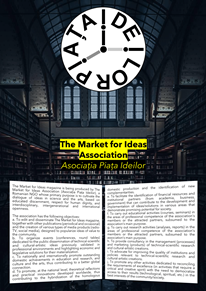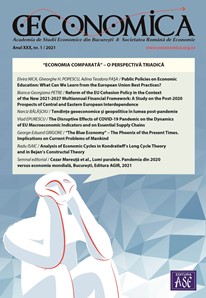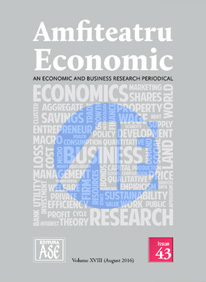
The Earthly Algorithms of the Heavenly Affairs Six years ago, “Pope Culture” flashbacks
The papal institution opens up the road to redemption for more than 1.200 million Roman-Catholics – that is for the so-called “Western Christianity” –, according to Vatican statistics. Through its doctrine of closeness to God, far and away from any canonical schisms, the Holy See inspires all Christianity, pervasively radiating to all hemispheres, over other distinct cults as well. The fact is that to be able to order the immanent chaos while indulging your mind to wander with the transcendent is a tough penance. Even if you have adhered to your faith wholeheartedly, the spiritual stakes were and are under assail by the modern-version-of-Canaan capitalist hedonism (now called insatiable consumerism), by the anti-social socialism (now dead, but still not buried), and by “welfare-warfare” statism (now, as ever, trying to divide and conquer, and command and control). The aforesaid progenitors of the human “fallen existence” have declared foreclosure on the most valuable assets of the life we lead, all except for the “perceivable physical” biases. The pitfalls looming ahead of all our mundane trespasses, entailed by the very nature of the interaction with our own kind, tarnished as that may be, are lurking as far as the eye can see, even what we now call in vernacular the supreme “consultancy” and “governance”: namely, the one covering the “salvation of our souls”. All human beings, with all their burning passions, are, since the beginning of times, fumbling in the dark to find their way to reach Him. And the mission is not easier even for His most faithful servants. As the supreme pontiffs, the Bishops of Rome, are (supposed to be).
Urbi…
Human flesh is inherently sinful. Theologically, this is because man is needy and he covets; biologically, because man is subdued by old age. Pope Benedict XVI, apart from the Holy See he occupied, was no less human than the sheep he shepherds: marred by his old age complaints, he was forced to reconsider his hold on the reins of the Holy Catholic Church. The Canon Law of the Catholic Church contends that such a deed – otherwise unheard of since 1415, when Pope Gregory XII stepped back to put an end to a schismatic spasm that had been prowling about the already severed Western Holy Catholic Church for four centuries – is enacted solely if it is done of free will and openly confessed as such. “The Papal endeavour, essentially a spiritual exertion, cannot be made effective by way of mere words or deeds, since prayer and suffering are also mandatory”, said the Pope in his retirement speech, intimating that both the weakness of the aging body and the entailed pressure it puts on the human mind in such appalling circumstances are so overbearing that man is crushed under this burden, and cannot possibly cope with so wide a scope and such fast changing conditions of his mission as those manifest these days.
Geography does override history, which is as true in power politics as it is in economics or in religion. Among the Top 10 most densely populated countries with Catholic majorities, Latin America houses four, including Brazil, the nation with the largest number of believers. Italy has the highest percentage of Catholics among the national community in Europe, while on the continent of Africa it is the Democratic Republic of the Congo that already boasts the second biggest Catholic population at global level. This is a world where the members of this religious community in Africa and Asia are constantly growing in numbers through a policy of more vigorous demographic dynamics in contrast with Mother Europe, but it is also a cosmos where cult diversity is swinging erratically between ecumenical openness and identity camouflage, thus off-shooting geopolitical debacles. In such a world, The Holy See and the Pope in person are badly in need of a shot of adrenalin, because for want of improved communication facilities, neither the communion nor the community can achieve perfection. Yet the Catholic Church, as well as most of its global counterparts, is bound to poise on its shoulders not just the planetary, but also its own interior balance. Like any social structure made up of – well, what do you know! – people in flesh and blood, deep within the Catholic Church “all the world’s a stage, and all the men and women merely players”.
Second to bowing to God’s will, people have also created submission to man’s will – the worldly need for prosperity and prestige, which historically are the cornerstone of a potpourri of entities, for better or for worse. And these very institutions, submitted to timeproof checks, are still a mishmash of local customs and maniac protocols. The Holy Catholic Church in person was affected by these man-of-the-world diseases that plague the above-mentioned institutional structures. While yearning for the absolute, the congregation is yet firmly stuck into the terra firma. A host of rival factions are endlessly clambering to assert authority in a far too centralized power structure, all peppered with intrigues and coups, corruption and eager-beaver postures. Even if not all of these occur inside the city walls of the cathedrals, they can materialize in the boudoirs in a strategy game where the sacred powers freely co-exist with the profane Machiavellian skills, all blending in a white plume of smoke that signals, best case scenario, a forthcoming truce. Can it be that the “political economy” of the Church must be the price we pay for consuming the premium brand global product that it generates? Likewise, these cost-benefit analyses, negotiations, concessions and compromises – such household words for mankind, yet so alien concepts to the justified, priceless, non-negotiable faith – are they truly indispensable beacons on the road to find “the Way and the Truth and the Life”? Groping like the blind in this world of scrambled means, how could we have forgotten about the End?
… et Orbi
“It seems my brother cardinals went to the end of the world to find a new Pope”, said Francis I, as freshly elected pontiff, in front of an audience who watched ecstatically the white smoke that rose among the rain drops which were falling in Saint Peter’s Square. Cardinal Jorge Mario Bergoglio, an Argentinean with Italian roots and Jesuit upbringing, is politically “ambidextrous”: “Right-wing”, therefore conservative, in terms of body-related issues, but “Left-wing”, therefore progressive, in terms of social and state assistance. He is known for his strongly asserted opinions on the discriminated groups in his place of birth. “We live in the most unequal part of the world, which has grown the most, yet reduced misery the least”, said Bergoglio during a gathering of Latin-American bishops. While the Christian pleading for moderation and mutual support is profoundly understood, redemption through the workings of statesmanship remains a morally sensitive topic.
The Pope chose his name inspired by Saint Francis of Assisi, the reformer of Catholic thought in the 13th century, said to be the one God Himself ordered to repair a Church brought at the brink of moral ruin in the Dark Middle Age, a period when princes and Popes fought for the earthly kingdom. The message of such a new need for recovery remains strong in a present period when more and more prelates of the Church seem to behave according to the saying “do as the priest says, not as he does”, and when the old mercantile lust for gold has been replaced, just as insidiously, by the sinful demands of the flesh. The Church started to be known in the media more for its paedophiliacs rather than for the services it provides, all this in a postmodern world in which the human is tempted to take refuge inside “fakebook” (sic!) accounts, while the Holy Scripture finds it increasingly hard to tackle the assaults of the tabloid gospels.
It is said that the election of a new Pope is a work of the Holy Spirit, who inspires the cardinal electors to make the right choice for the City. Still, for the profane public, the entire election ritual seems affected by political calculations, rather than inspired by divine light. This feeling persists although the reduced deliberation time, Lilliputian according to political standards, is meant to maintain in the mind of the community the idea that the common denominator has been planted long before in the conclave, and it is only the limited human insight that prevents the quick understanding of the light coming from above. But the scientist is always ready to give terrestrial significance even to the holy work. Researchers in social sciences, of various epistemic and doctrinal orientations, are trying to explain the alchemy involved in electing the Pope by reducing it to pure calculations: is the election of the Pope a game theory exercise, behavioural economics, mechanism design and other similar mundane things? But, then, where would the “sacrament” be?
It is said that Pope John Paul II asked the Pontifical Academy of Social Sciences to form a counselling group made up of renowned political scientists, sociologists and economists to help create a mechanism for the papal conclave in order to minimise the risk of potential delays or failures in the election process. One of the economists called to participate in the crusade for improving institutional design was Kenneth Arrow, Nobel laureate in economics, whose most valuable contribution is related to the field of “voting paradoxes”: the idea developed by him as the “impossibility theorem” explains how “conflicting majorities” can make it impossible to assign a representative winner even in the case of fair elections; the same principle, yet explained in other words: “collective preferences tend to be cyclical, although individual preferences are not”. Does the peace within the Sistine Chapel remain also to be determined by algorithms?
[Originally written in Romanian in 2013.]








